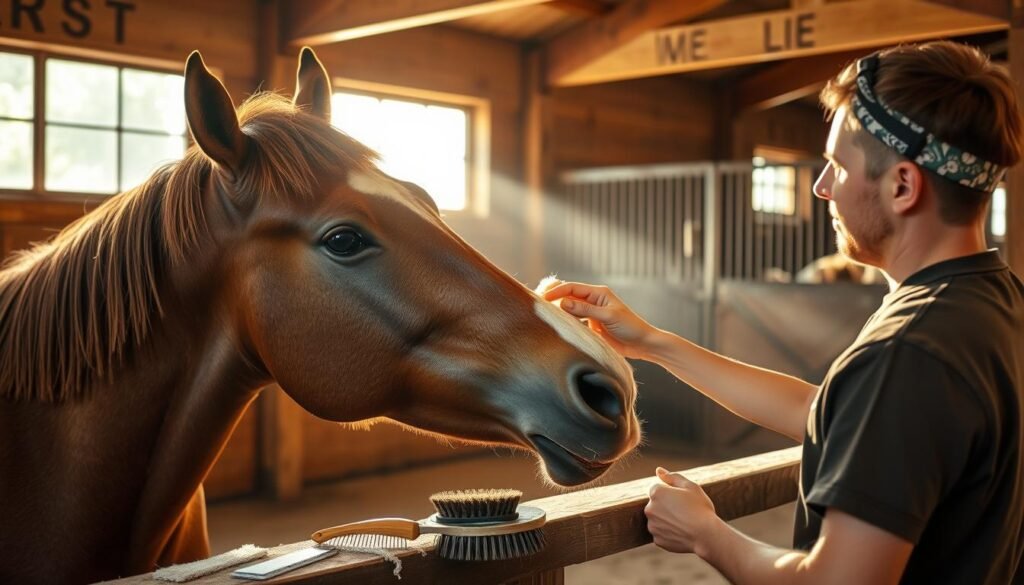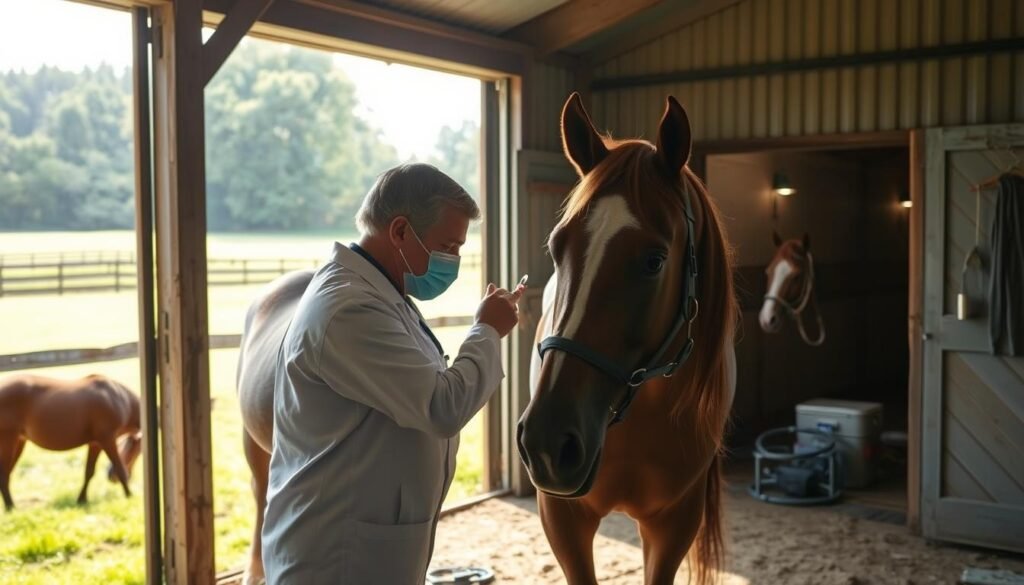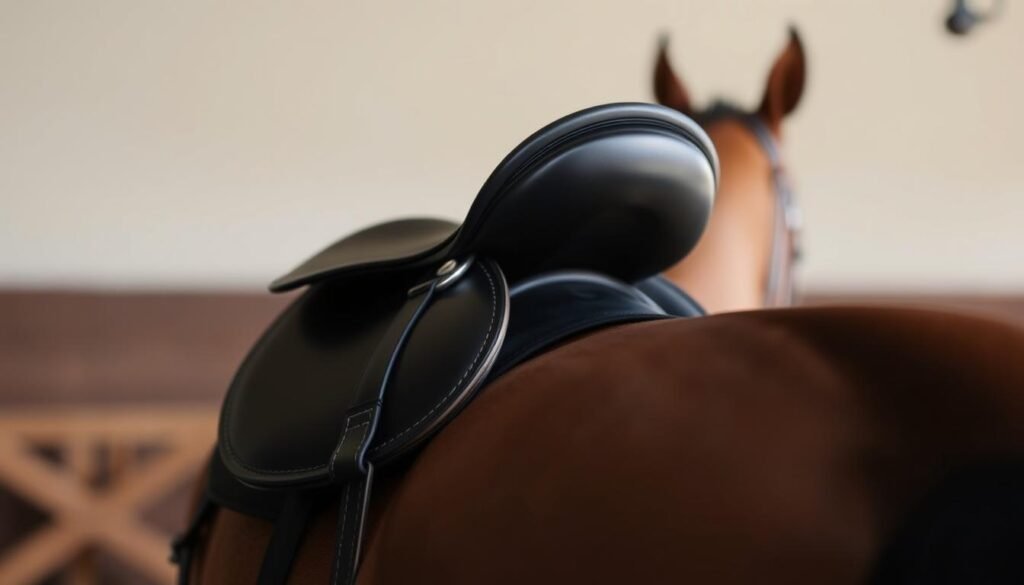Are you committed to providing your horse with the care he needs? Owning a horse is rewarding, but it comes with great responsibilities. Your horse’s health depends on your attention to his nutrition, grooming, and veterinary needs.
By knowing the key parts of horse health care, you can help your horse live a long, healthy life. That way, you can enjoy many happy years together.
Table of Contents
Key Takeaways
- Proper nutrition, including a balanced diet of hay, grain, and pasture grazing, is crucial for your horse’s health.
- Regular hoof care, dental examinations, and deworming are essential to prevent issues like lameness and gastrointestinal parasites.
- Grooming and monitoring your horse’s vital signs can help you identify and address any health concerns early on.
- Vaccinations and disease prevention measures are vital to protect your horse from infectious diseases.
- Maintaining the correct weight and ensuring proper tack and saddle fit are important for your horse’s overall well-being.
The Importance of Proper Horse Care
Owning a horse is rewarding but comes with big responsibilities. It’s key to care for your horse’s health, happiness, and well-being. By knowing your horse’s needs and providing the right care, you can create a strong bond and enjoy a fulfilling partnership.
Caring for Your Equine Companion’s Well-being
Caring for a horse is more than just feeding, watering, and housing them. It’s about their overall wellness, including nutrition, hoof care, dental care, parasite management, and grooming. Spending time and effort on these areas helps keep your horse physically and mentally healthy, allowing them to thrive and live a high-quality life.
Understanding Your Horse’s Needs
Every horse is unique, with its own needs and preferences. Knowing your horse’s specific needs is vital for their well-being. Things like age, breed, activity level, and environment can affect their care. By paying attention to your horse’s behavior and adjusting your care, you can create a nurturing environment that supports their health and happiness.
Proper equine care is not just a legal duty but a moral one. By focusing on your horse’s welfare, you ensure their well-being and strengthen your bond. Investing in your horse’s care is an investment in a rewarding and enriching relationship that can last for years.
“A horse is a thing of beauty… none will tire of looking at him as long as he displays himself in his splendor.” – Xenophon
Nutrition: Feeding Your Horse Right
Feeding your horse right is key to their health and happiness. Horses love to graze, so feed them small meals all day. Aim to give them 1-2% of their body weight in forage like grass and hay each day.
The Balanced Diet for Optimal Health
A balanced forage diet is best for horses. But, sometimes they need extra minerals or vitamins. Make sure their diet has all the nutrients they need for health and performance.
Hay, Grain, and Grazing: What Your Horse Needs
Hay should be the main part of your horse’s diet. It gives them fiber and nutrients. Oats are a safe and easy grain to add to their hay. Pasture grazing is also good, but watch how much they eat to keep their diet balanced.
| Nutrient | Recommended Daily Intake |
|---|---|
| Forage (Hay and Grass) | 1-2% of Body Weight |
| Grain | 0.5-1.5% of Body Weight |
| Water | 10-15 Gallons |
Changing your horse’s diet should be done slowly. Take 5-7 days to make any changes. This helps prevent stomach problems. A balanced diet of hay, grain, and grazing keeps your horse healthy and happy.
Hoof Care: Maintaining Healthy Hooves
Proper hoof care is key for your horse’s health and performance. Regular care from you and your farrier keeps hooves strong and healthy.
Trimming and shoeing needs change with the seasons. In summer, trim or shoe every 6 to 8 weeks. Show horses might need more visits. Winter slows hoof growth, so visits can be every 6 to 12 weeks, but some horses may need more.
A balanced diet with biotin, iodine, methionine, and zinc helps hooves grow well. Also, make sure your horse always has fresh, clean water.
Addressing Hoof Issues
Hoof problems like long toes, collapsed heels, cracks, and thrush can cause pain and lameness. Regular trimming and shoeing, as advised by your farrier, can prevent and fix these issues. It’s vital to work with your farrier and vet to create a care plan for your horse.
- Hoof cracks need special care, like moisturizing and regular trims.
- Thrush, a bacterial infection, is managed by keeping stalls clean and addressing hoof imbalances.
- Solar abscesses need soaking, foreign body removal, and bandaging to heal.
Deeper issues like laminitis, founder, and navicular disease need special care. This includes regular shoeing, trimming, and support to avoid more problems.
“Maintaining your horse’s hoof health is a crucial aspect of their overall well-being. By working closely with your farrier and veterinarian, you can ensure your equine companion’s hooves remain strong and healthy.”
Dental Care: Keeping Those Teeth in Check
Proper dental care is key for your horse’s health. Horses’ teeth grow all their lives, leading to dental problems. Regular dental care, or floating, is needed to fix these issues.
Signs of Dental Issues in Horses
It’s important to spot dental problems in your horse. Look for signs like dropping feed, balling hay, or head tossing. If your horse seems uncomfortable, see a vet right away.
Regular Dental Check-ups and Care
Take your horse for dental check-ups at least once a year. Some may need more visits. Dental issues can cause weight loss and affect digestion.
Feed your horse quality hay and grains like oats and barley. Make sure they have clean water. Knowing about dental health and regular care is crucial.
“Dental problems can lead to weight loss in horses due to inefficient digestion, affecting their overall health.”
Vets suggest dental exams for horses every six months to a year. Adult horses have 40 teeth. Look out for signs of dental emergencies like bleeding or head-shaking.
Deworming: Controlling Parasites
Keeping your horse healthy is more than just good food and grooming. Deworming is key to their care. Now, deworming is more focused on specific parasites, not just a routine.
Targeted Deworming for Effective Parasite Management
Understanding your horse’s parasites is the first step. Regular fecal egg count tests help find the right deworming. This way, your horse gets the right treatment without overusing dewormers.
Every horse and donkey should get dewormed once a year with ivermectin and praziquantel in winter. This combo fights many parasites, keeping them safe.
“Developing a comprehensive and cost-effective parasite control program in consultation with a veterinarian is crucial for maintaining the health, well-being, and productivity of horses on the farm.”
With a focused deworming plan, your horse stays healthy. This means they can perform better and live longer.
Grooming: More Than Just Appearance
Grooming your horse is key for more than looks. It’s crucial for their health and happiness. A regular grooming routine helps spot problems early, keeps their coat and skin healthy, and makes them comfortable.
Brushing your horse’s coat every day cleans off dirt and sweat. It also spreads natural oils, making their coat shiny and helping them stay cool.
- Use different brushes like curry combs and soft-bristled ones for grooming.
- Body clipping is good for horses with thick coats.
- Choose the right grooming products, like shampoos, for their coat and skin.
Bathing your horse often, especially in warm weather, keeps them cool and their skin clean. Don’t forget about hoof care. Regularly picking and checking their hooves is important for their health.
| Grooming Tool | Purpose |
|---|---|
| Rubber Curry Comb | Loosens dirt, mud, and shedding hair from the coat |
| Stiff-Bristled Brush | Removes deeper-set dirt and grime |
| Soft-Bristled Brush | Smooths the coat and distributes natural oils |
| Hoof Pick | Cleans and inspects the hooves for potential issues |
Grooming is more than looks; it’s vital for your horse’s health. A good grooming routine keeps their coat, skin, and hooves in great shape.

Horse Health: Monitoring Vital Signs
It’s key to watch your horse’s vital signs closely. Knowing the normal ranges for temperature, pulse, and respiration helps spot health issues early.
Temperature, Pulse, and Respiration Ranges
A healthy horse’s temperature is between 99.5°F and 100.5°F. Their pulse should be 28 to 42 beats per minute. Their breathing rate should be 8 to 12 breaths per minute. These numbers can change based on the horse’s age, how active they are, and their environment.
To check your horse’s temperature, use a digital or glass thermometer. Digital thermometers give a reading in 60 seconds. Glass thermometers take at least two minutes. To find the pulse, count beats for 15 seconds and multiply by four. For breathing, watch the nostrils or listen with a stethoscope for 30 seconds or a minute.
Recognizing Behavioral Changes
Watching your horse’s behavior is also important. Look for signs like:
- Less interest in food or water
- Changes in manure
- Feeling tired or less active
- Being more sensitive to touch
- Standing in an odd way
By knowing your horse’s usual behavior and vital signs, you can spot problems early. This helps keep your horse healthy and happy.
| Vital Sign | Normal Range |
|---|---|
| Temperature | 99.5 – 100.5°F |
| Pulse | 28 – 42 beats per minute |
| Respiration | 8 – 12 breaths per minute |
“Monitoring your horse’s vital signs and behaviors is crucial for maintaining their overall health and well-being. By staying informed and vigilant, you can catch any potential issues early and provide the necessary care to keep your equine companion happy and healthy.”
Vaccination and Disease Prevention
Keeping your horse healthy is a big responsibility for horse owners. Vaccination is key to preventing diseases. Let’s look at the important vaccinations for your horse.
Essential Equine Vaccinations
Horses need vaccines for tetanus, Eastern Equine Encephalomyelitis (EEE), Western Equine Encephalomyelitis (WEE), West Nile Virus (WNV), and rabies. These vaccines protect against deadly diseases that horses can catch from insects or the environment.
There are also at-risk vaccines for your horse. These include protection against equine influenza virus (EIV), equine herpesvirus 1&4 (EHV1&4), Strangles, Potomac Horse Fever, anthrax, botulism, leptospirosis, and equine viral arteritis. The need for these vaccines depends on your horse’s lifestyle and risk factors.
| Vaccine | Initial Dose | Booster Schedule |
|---|---|---|
| Rabies | 4-6 months | Annual |
| West Nile Virus | 4-6 months | Every 6-12 months |
| Equine Encephalitides | 4-6 months | Every 6-12 months |
| Rhinopneumonitis | 4-6 months | Every 6-12 months |
| Equine Influenza | 6 months | Every 6-12 months |
| Strangles | 6-9 months | Every 6-12 months |
| Potomac Horse Fever | 3 months | Annual |
| Botulism | 6 months | Annual |
| Equine Viral Arteritis | 6 months | Annual |
It’s important to talk to your vet about your horse’s vaccination schedule. They can help make sure your horse gets the right equine vaccinations and booster shots. This, along with good care and safety measures, keeps your horse healthy.

Weight Management
Keeping your horse at the right weight is key for their health. Horses that are too heavy or too light face many health problems. Use body condition scoring (BCS) and weight monitoring to check their condition.
BCS checks the fat under your horse’s skin. The Henneke scale goes from 1 to 9. A score of 4 to 6 is perfect. Scores 7 to 9 mean your horse is too heavy.
To track your horse’s weight, use a weigh tape or a weigh bridge. It’s best to check their weight every week. This way, you can keep them at the right weight.
| Measurement | Ideal Range | Overweight Indicator |
|---|---|---|
| Body Condition Score (BCS) | 4 to 6 | 7 to 9 |
| Girth-to-Height Ratio | Less than 1.26 | Equal to or greater than 1.26 |
| Cresty Neck Score | 0 to 2 | 3 or greater |
Too much weight can cause serious health problems. These include laminitis and Equine Metabolic Syndrome. It can also hurt their performance and make their hooves and joints worse.
To help your horse stay at a good weight, change their diet. Eat less and more fiber. Also, make sure they get plenty of exercise. This burns fat and keeps their muscles and bones strong.
“Monitoring your horse’s weight and body condition is essential for their overall health and well-being. A proactive approach to weight management can help prevent a range of health issues and ensure your equine companion remains in peak condition.”
Tack and Saddle Fit
Getting the right fit for your horse’s tack and saddle is key for their health and your safety. It’s important to make sure the bridle, bit, and saddle fit well. This helps avoid any pain or discomfort for your horse.
Horses need to be checked by a tack fitter at least twice a year. This is especially true if they’re growing or changing shape. A bad saddle fit can cause a lot of problems, like pain and discomfort. Signs include tail swishing, avoiding tack, and being uncomfortable with the girth.
If you notice any of these signs, it’s time to see a professional saddle fitter. While pads can help, they’re not a long-term solution. Regular checks by a certified equine bodyworker and saddle fitter are crucial for your horse’s comfort.
Things like weight changes, new riders, and more use can affect saddle fit. It’s vital to have your saddle and horse tack checked often to make sure they still fit right.
Assessing Saddle Fit
When checking a saddle’s fit, there are several important things to look at:
- Saddle balance
- Panel contact
- Wither clearance
- Gullet width
- Tree width
- Billet alignment
- Seat size
- Tree integrity
Not having enough clearance at the withers is a common problem in performance horses. Too much padding can also be a problem. Getting the saddle fit right is key to keeping your horse healthy and preventing problems.

“Proper bridle fit and saddle fit are crucial for the health and comfort of the horse, as well as the safety of the rider.”
Getting regular checks from a qualified professional is the best way to make sure your horse’s tack fits right. This ensures it meets their individual needs.
Conclusion
Caring for a horse is a big job, but it’s worth it. You get to have a healthy, happy horse by your side. To keep your horse well, follow these key care tips. This includes horse health, equine care, and comprehensive horse care.
Work with your vet and farrier to make a care plan that fits your horse’s needs. This way, you can ensure your horse stays healthy and happy for a long time.
Every part of horse health and equine care is important. This includes feeding right, taking care of hooves, and watching for parasites. Being careful and proactive helps avoid health problems.
By doing this, you give your horse the best life possible. This makes your horse’s life better and yours too.
As you start caring for your horse, remember their needs can change. Stay open to learning and changing your care methods. With hard work and understanding your horse’s needs, you can have a great partnership. This partnership will last a long time and bring joy to both you and your horse.
Learn about 5 types of horses.



Pingback: Adorable Little Horse: Your Miniature Equine Guide